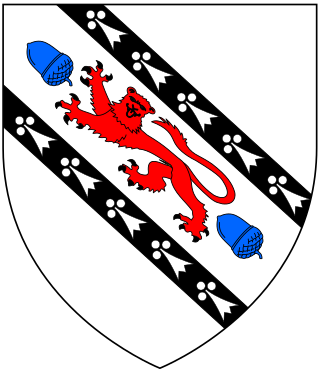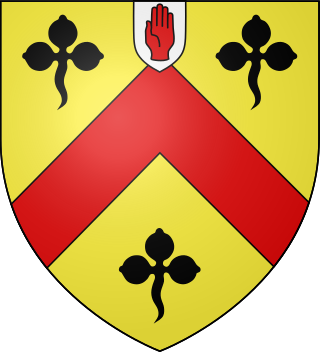
There have been six baronetcies created for persons with the surname Smyth, two in the Baronetage of England, one in the Baronetage of Great Britain, one in the Baronetage of Ireland and two in the Baronetage of the United Kingdom. One creation is extant as of 2010.

There have been twenty one baronetcies created for persons with the surname Williams, eight in the Baronetage of England, three in the Baronetage of Great Britain and ten in the Baronetage of the United Kingdom. Only six of the creations are extant as of 2017.

There have been four baronetcies created for persons with the surname Hope, three in the Baronetage of Nova Scotia and one in the Baronetage of the United Kingdom. As of 2010 one creation is extant, one dormant and two extinct.
The Worsley family is an English family that is derived from Sir Elias de Workesley, a Norman knight who was a youth at the time of the Norman conquest. He later accompanied Duke Robert II of Normandy on the First Crusade and was buried at Rhodes.

There have been five baronetcies created for members of the old established family of Peyton of Peyton Hall in the parish of Boxford in Suffolk, all of whom were descended from Sir Robert Peyton of Isleham in Cambridgeshire, grandson and heir of Thomas Peyton (1418–1484) of Isleham, twice Sheriff of Cambridgeshire and Huntingdonshire, in 1443 and 1453. All the baronetcies are extinct.

The Rodes Baronetcy, of Barlborough in the County of Derby, was a title in the Baronetage of England. It was created on 14 August 1641 for Francis Rodes, of Barlborough Hall, near Chesterfield, Derbyshire. The early family of Rodes was seated in Nottinghamshire. A William Rodes acquired an estate in Derbyshire by marriage. Sir Francis Rodes built Barlborough Hall in 1583–4. The first Baronet was his grandson. The title became extinct on the death of the fourth Baronet in 1743, when the estates passed to his sister's heirs, the Heathcotes and Heathcote-Rodes families.

There have been four baronetcies created for persons with the surname Cope.
The Firebrace Baronetcy, of London, was a title in the Baronetage of England. It was created on 28 July 1698 for Basil Firebrace, Member of Parliament for Chippenham from 1690 to 1692. He was the son of Sir Henry Firebrace. The third Baronet sat as Member of Parliament for Suffolk. The title became extinct on his death in 1759.

The Winchcombe Baronetcy, of Bucklebury in the County of Berkshire, was a title in the Baronetage of England. It was created on 18 June 1661 for Henry Winchcombe. The second Baronet sat as Member of Parliament for Berkshire. The title became extinct on his death in 1703. The Winchcombe estates passed to his eldest daughter, Frances Winchcombe, wife of Henry St John, 1st Viscount Bolingbroke.

The Elwes Baronetcy of Stoke-by-Clare in the County of Suffolk, was a title in the Baronetage of England held by the Elwys family, whose name through the years has alternately been spelled Helwish, Helewise, Helwys, Elwaiss and Elwaies.
Sir Thomas Windebank, 1st Baronet was Member of Parliament (M.P.) for Wootton Bassett and supported the Royalist cause in the English Civil War. He was Clerk of the Signet from 1641 until 1645 and again from 1660 to 1674.

The Wolstenholme Baronetcy, of London, was a title in the Baronetage of England. It was created on 10 January 1665 for John Wolstenholme, who had previously represented West Looe, Newport and Queenborough in Parliament. He had been heavily fined by the Parliamentarians for supporting the Royal cause during the Civil War. The third Baronet sat as Member of Parliament for Middlesex. The title became extinct on the death of the seventh Baronet in 1762.

The Winch Baronetcy, of Hawnes in the County of Bedford, was a title in the Baronetage of England. It was created on 9 June 1660 for Humphrey Winch, subsequently Member of Parliament for Bedford, Bedfordshire and Great Marlow and a Lord Commissioner of the Admiralty. He was the grandson and namesake of Sir Humphrey Winch. Winch had no sons and the title became extinct on his death in 1703, although it was erroneously assumed by his nephew, Humphrey Winch, of Branston, Lincolnshire.

Sir Robert Barnham, 1st Baronet of Boughton Monchelsea Place was an English politician who sat in the House of Commons from 1660 to 1679.

The Wintour Baronetcy, of Hodington in the County of Worcester, was a title in the Baronetage of England. It was created on 29 April 1642 for George Wintour. He was childless and the title became extinct on his death in 1658.

The Assheton Baronetcy, of Lever in the County of Lancaster, was created in the Baronetage of England on 28 June 1620 for Ralph Assheton. The second Baronet sat as Member of Parliament for Clitheroe. The title became extinct on the death of the fourth Baronet in 1696.

The Abdy baronetcy, of Albyns, in the County of Essex, was created in the Baronetage of England on 9 June 1660 for Robert Abdy. It became extinct on the death in 1759 of the 4th baronet.

The Abdy Baronetcy, of Moores, in the County of Essex, was created in the Baronetage of England on 22 June 1660 for John Abdy. It became extinct on his death c.1662.

The Astley Baronetcy, of Patshull in the County of Stafford, was created in the Baronetage of England on 13 August 1662 for Richard Astley. The second Baronet represented Shrewsbury and Shropshire in the House of Commons. The title became extinct on his death in 1772.
Sir John Wentworth, 1st Baronet, of Gosfield, Essex, was an English aristocrat.















